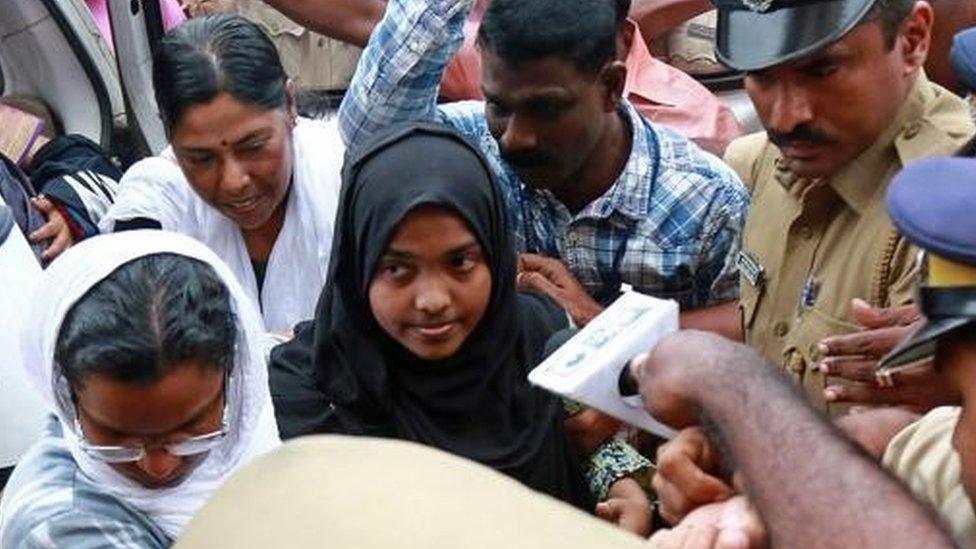India Love Project: The Instagram account telling tales of 'forbidden' love
- Published
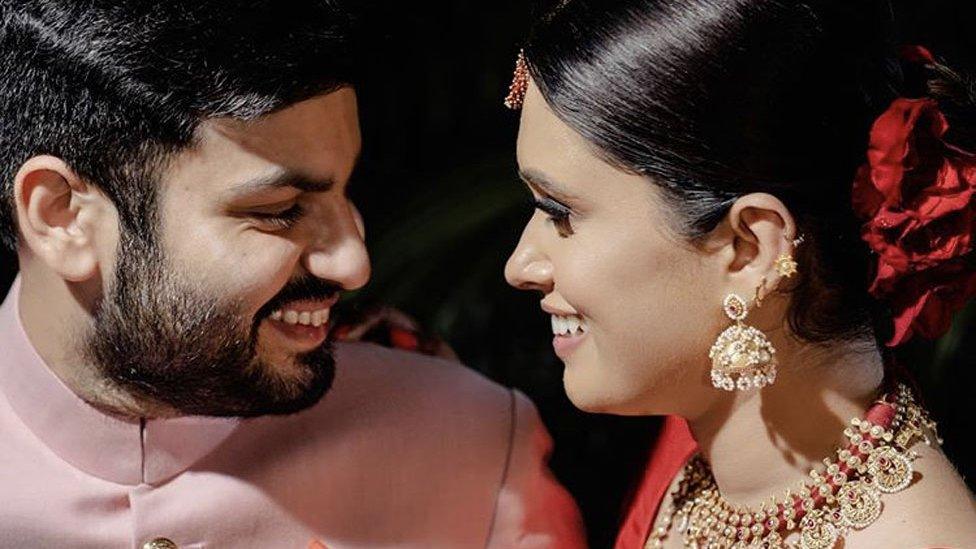
Martina Roy, a Christian, married Zain Anwar, a Muslim, in September after a seven-year wait for her family to accept him
In India, where love and marriage outside of caste and religion have long attracted censure, a new project on Instagram celebrates unions that break "the shackles of faith, caste, ethnicity and gender". The BBC's Geeta Pandey in Delhi reports.
Interfaith and inter-caste marriages have long been frowned upon in conservative Indian families, but in recent years, the conversation around such unions has become even more fractious. And most scorn is reserved for alliances involving Hindu women and Muslim men.
Just how deep the chasm is was brought into sharp focus last month when popular jewellery brand Tanishq withdrew an advertisement featuring an interfaith couple after a right-wing backlash on social media.
The ad showed a baby shower organised for a Hindu mum-to-be by her Muslim in-laws. Tanishq, owned by the Tatas, one of India's biggest companies, called its new range Ekatvam - which translates from Hindi as "unity".
It was meant to celebrate the concept of "unity in diversity", but it ended up doing the exact opposite - it laid bare the fissures that exist in Indian society.
Radical Hindu groups said the advert promoted "love jihad" - an Islamophobic term that implies Muslim men prey on Hindu women to seduce them and marry them with the sole purpose of converting them to Islam.
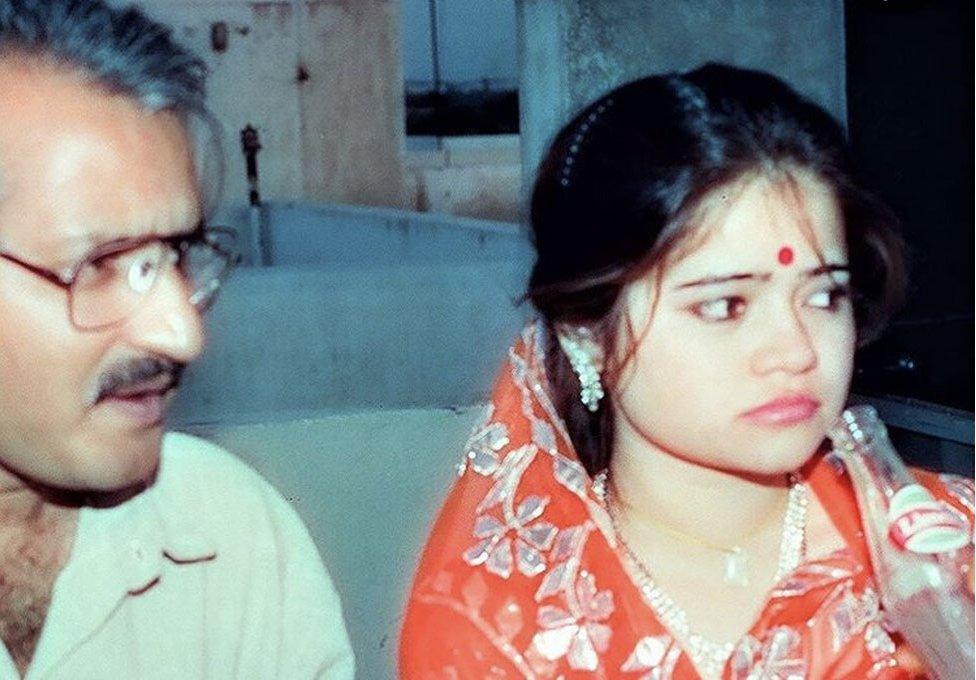
Rupa and Razi Abdi have been married for 30 years
Social media trolls led calls to boycott the brand, taking it to the top of Twitter trends. The company said in a statement that it withdrew the ad keeping in mind the safety of its employees.
Two weeks after the row over the ad, journalist couple Samar Halarnkar and Priya Ramani and their journalist-writer friend Niloufer Venkatraman launched the India Love Project, external on Instagram, describing it as "a celebration of interfaith/inter-caste love and togetherness in these divisive, hate-filled times".
Mr Halarnkar told the BBC they had been "thinking about the project for a year, even more" and that the controversy over the Tanishq ad lent it an immediacy, turning it into an idea whose time has come.
"We've felt very strongly about - and been disturbed by - the fake narrative around love and interfaith marriage," he told me.
"There is a narrative that there are other, more insidious, motives for marriage, that love is being weaponised. But we didn't know anyone who was thinking like that, who had any other motive than love for getting married."
Through India Love Project, he says, "we are just providing a platform where people can share their stories".
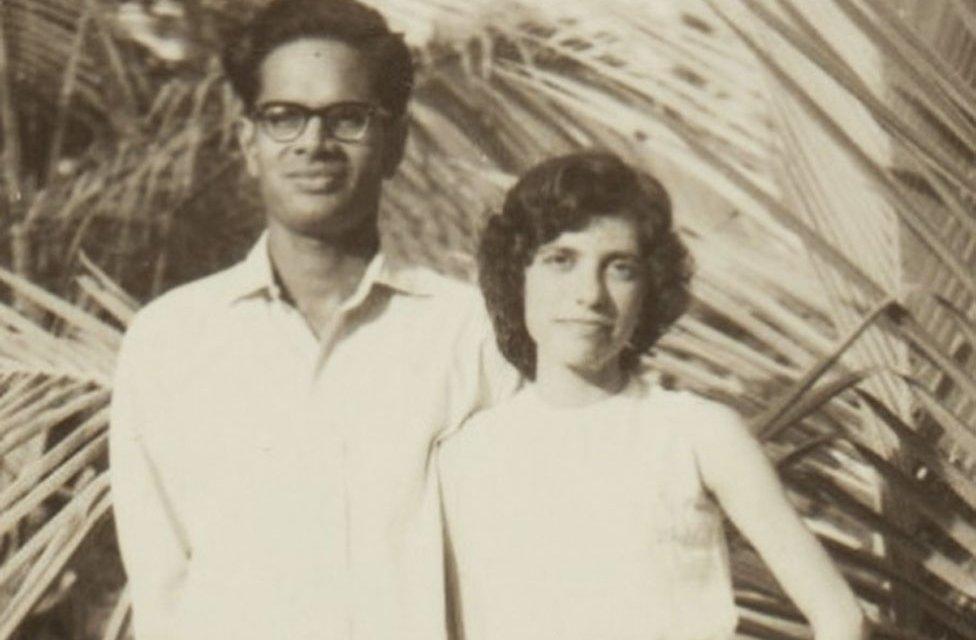
The project started with Niloufer Venkatraman's story of her Parsi mother and Hindu father
Since 28 October - when the project kicked off with the first story by Ms Venkatraman about her Parsi mother Bakhtawar Master and Hindu father S Venkatraman - a new story has been published every day.
The response, Mr Halarnkar says, has been overwhelming. "We are struggling to cope. Every day we hear from people who say 'I want to tell my story, or my parents' story or my grandparents' story. It also shows that interfaith and inter-community marriages are not new, they were happening all along."
But, he adds, "it's important to talk about them now more than ever".
"At a time when hate is being manufactured, it's important to tell these stories of love and how widespread it is and that it's not just a flash in the pan."
In India, more than 90% of all marriages are arranged - and families rarely look beyond religion and caste while fixing alliances. According to the India Human Development Survey, only about 5% of marriages are inter-caste. Interfaith unions are even rarer - one study put them at just over 2.2%.
And those choosing to marry outside of these boundaries often face violence - and can even be killed.
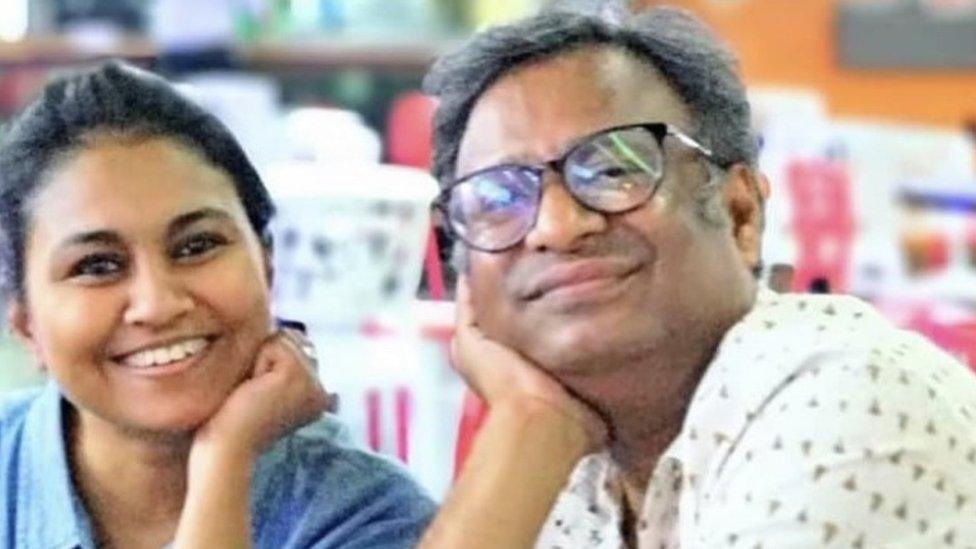
Tanvir Aeijaz and Vineeta Sharma were asked what religion their child would follow
In recent years, with a Hindu nationalist government in power, conservatism has gained support in India and religious polarisation has grown.
And interfaith marriages - especially those involving Hindu women and Muslim men - are being ascribed a much more sinister motive.
"In February," Mr Halarnkar says, "the government told the parliament that 'love jihad' was not defined by law and that no such cases were reported by any government agencies, but the idea persists. In recent days, at least four BJP-ruled states have announced plans to introduce legislation to curb this 'social evil'."
It is this "narrative of hate" that India Love Project seeks to challenge through its bank of personal stories, often described as "warm and fuzzy" by readers.
The short 150-word stories are written with affection and humour; and tell tales of couples who believe that love does not recognise man-made boundaries.
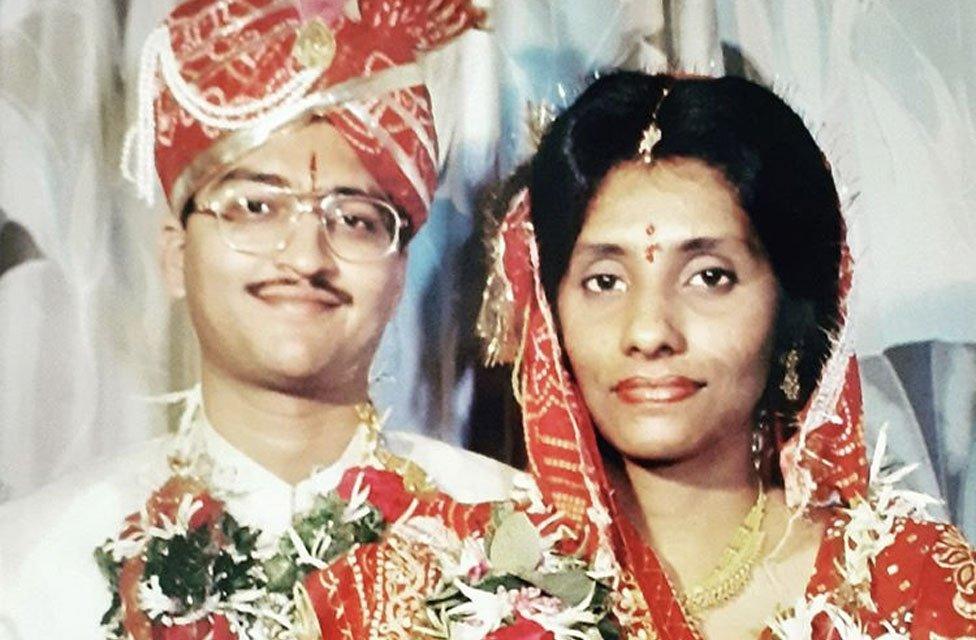
Maria Manjil and Sandeep Jain married 22 years ago
Rupa, a Hindu Brahmin, writes about her mother's first reaction when she told her that she was planning to marry Razi Abdi, a Muslim.
"He'll say 'talaq, talaq, talaq' three times and kick you out," her mother said, worried about the practice of instant divorce in Islam, now outlawed in India.
"However, once my parents met Razi and realised what a wonderful human being he was, their misgivings faded," she writes, describing them as "relatively open-minded".
It's been 30 years since Rupa and Razi got married. They have two adult sons and celebrate the Muslim festival of Eid and the Hindu festival of Diwali in their home.
Writing about his marriage with Salma, journalist TM Veeraraghav says in their home religion isn't "as important as curd rice versus mutton biryani!"
"I remain vegetarian, she enjoys her mutton and the product of our love [their child Ainesh] gets the best of both worlds. Ainesh is a Hindu or Muslim, depending on what's cooking."
In a recent post, Tanvir Aeijaz, a Muslim married to Vineeta Sharma, a Hindu, writes about the story of naming their daughter, Kuhu. The couple were asked whether it was a Hindu name or a Muslim name? And what religion would their daughter follow when she grows up?
"That our Hindu-Muslim marriage can be a role model of secularism seems to belie people's expectations," he writes. "They're dumbfounded, almost disappointed that our love would have to be called love, and not love jihad."
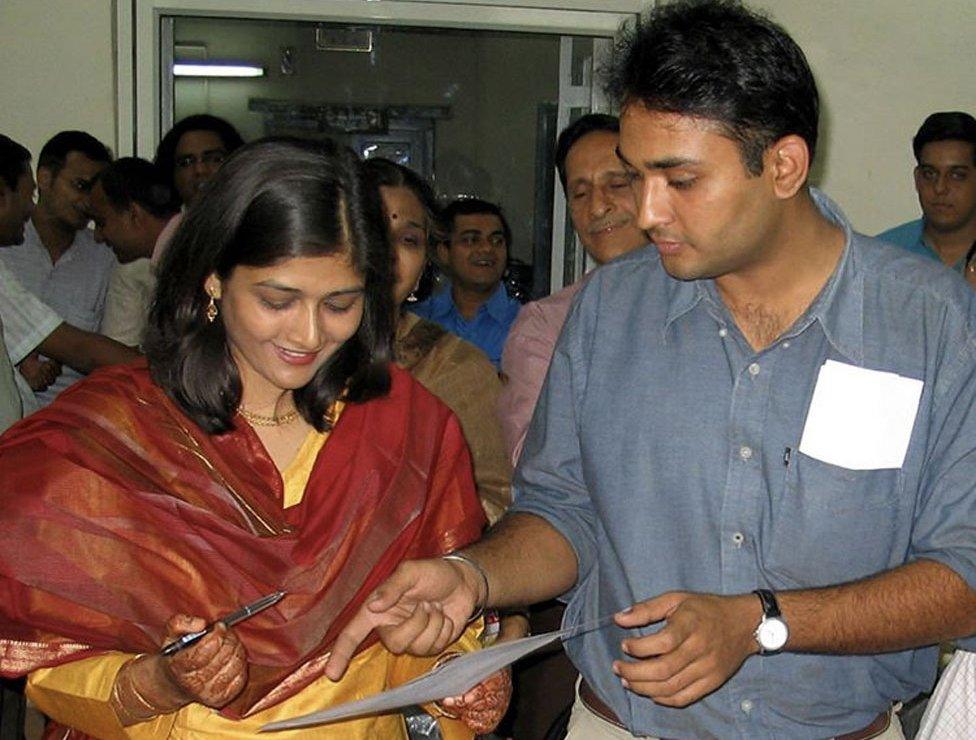
TM Veeraraghav and Salma say in their home religion isn't "as important as curd rice versus mutton biryani!"
The Instagram account also features stories of other interfaith and inter-caste marriages.
Maria Manjil, a non-vegetarian Catholic from a liberal family in Kerala, who married Sadeep Jain, a north Indian vegetarian Jain from a conservative family, writes about the "many challenges" they've faced in their 22 years of marriage but is convinced that she did the right thing by marrying him.
"How can you turn away from love?" she writes. "I saw his kind heart, gentle demeanour, intellectual compatibility, and deep affection for me. I couldn't let him go just because he prayed to a different god and spoke a different language."
Mr Halarnkar says it's stories like these that make you feel better about the world and about India.
"These are all beautiful stories of myriad realities of India. People follow so many different paths to love. They are a reminder that that's what India is about."
- Published13 October 2020
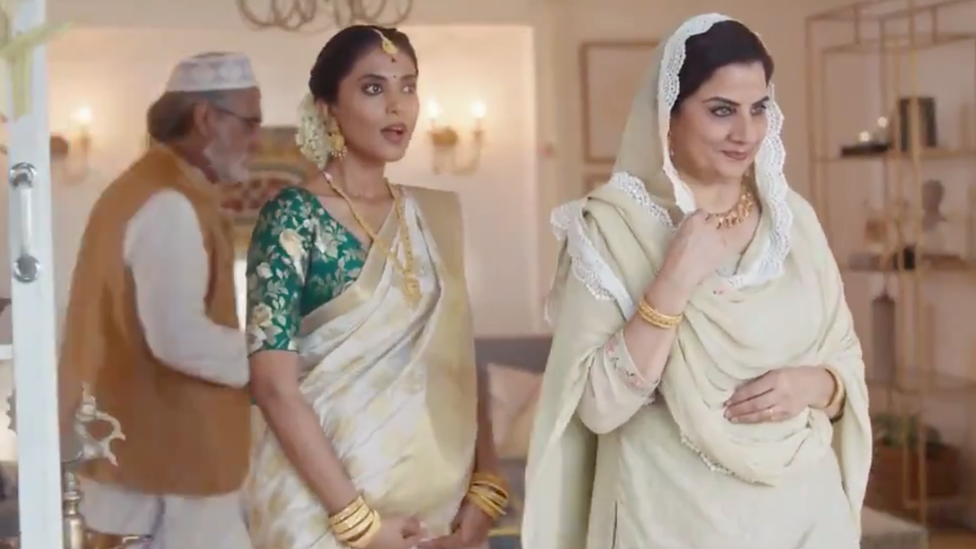
- Published12 December 2017
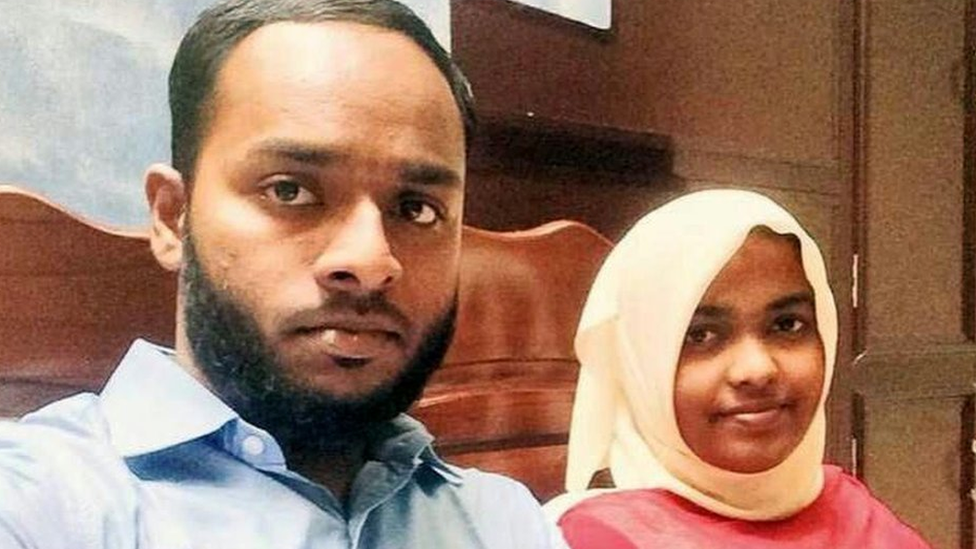
- Published5 February 2018
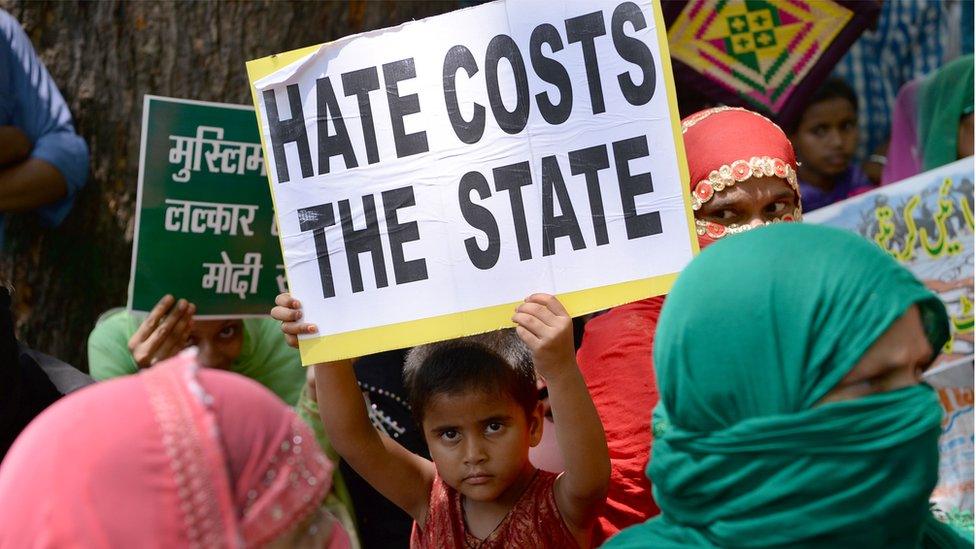
- Published8 March 2018
